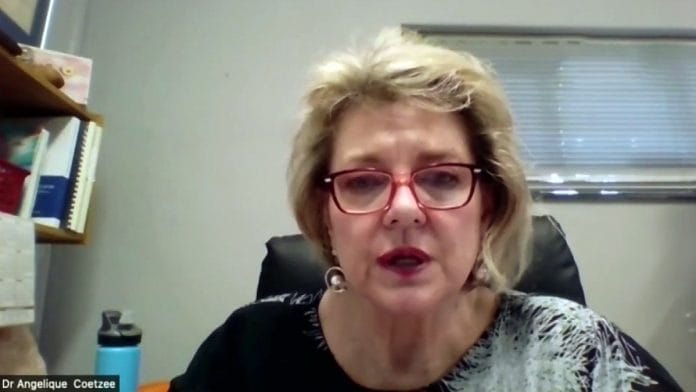New Delhi: Covid patients infected by the Omicron variant, whether vaccinated or not, usually experience mild symptoms, though in the unvaccinated, they are more intense and last longer, said Dr Angelique Coetzee, who is among the physicians who first flagged the highly mutated strain in South Africa.
Among the vaccinated, two or three days are usually enough for alleviation of symptoms, she added.
Pfizer is one of two vaccines currently being administered in South Africa. The other is Johnson & Johnson’s.
“We are seeing more breakthrough infections with Pfizer vaccines, but remember more people were vaccinated with Pfizer and not so many with the Johnson & Johnson vaccine,” Dr Coetzee said in an exclusive conversation with ThePrint.
Chairperson of the South African Medical Association, a professional association for public and private sector medical practitioners, Dr Coetzee has been a clinical physician for 33 years. She is based out of Pretoria.
Breakthrough infections are those that happen more than a fortnight after a person has completed full vaccination as per protocol, said Coetzee. The time lag is to account for the full immune response to be mounted.
“Health workers have been vaccinated since February this year with J&J. We saw breakthrough infections in healthcare workers during the third wave too. Even though it was Delta, they were less severe but some doctors died even after being vaccinated,” said Coetzee.
With South Africa reporting several thousand cases per day since the Omicron announcement, there is now more clarity about the behaviour of the variant than there was earlier.
“What we have learnt is that it is quite transmissible. Is it more than Delta? We do not know. Whether it will infect more people than Delta at the end of the day, we will have to see. It can be diagnosed using a PCR test,” she said.
“We also know you can test on rapid tests between one and five days of symptoms. In the primary healthcare set-up, most of the cases are mild, no need for hospitalisation. No oxygen needed for majority patients. In the beginning of any wave, children and younger people are the first to be affected,” she added. “As the wave progresses, more elderly, people with comorbidities, start getting affected. When that happens, we will know exactly how many severe cases there are.”
Also Read: Omicron patients have to be treated in designated Covid facilities, Centre tells states
‘Most findings in children were incidental’
There have been reports from South Africa about the Omicron variant affecting more children, but Coetzee said there is more to the story than the hype.
“We have not seen a lot of flu cases during the winter (June to August). Now, with the rains that we have had in the last week and the week before, we are seeing a lot of children with flu, respiratory tract infections, normal tonsillitis, normal diarrhoea coming in, but they test positive for Covid,” she added. “The impression is that a lot of Covid children have been admitted, but the majority is incidental finding because we are testing everybody for Covid.”
South Africa is currently vaccinating children aged between 12 and 17 years, but the uptake is not as good as physicians would have hoped, she said. Children often complain of sore throat, headache, report low-grade fever, an elevated pulse rate, but are usually back to their usual schedule, playing outside, in three days, she added.
Importance of booster doses
Going forward, booster doses are going to be important, especially in older people and people with comorbidities, said Dr Coetzee.
Although it is not clear whether the Omicron variant originated in South Africa or traveled there from somewhere else, the country is now awaiting a decision on booster doses.
“In the next week or so, we expect an announcement from the minister on boosters for the 50+ or 60+ age group. We currently have about 65 per cent of the population vaccinated, but there are not so many anti-vaxxers. People are often just lazy,” she added.
Asked about the importance of boosters for countries like India where Omicron cases are still few, she said getting the maximum number of jabs administered is important.
“The 50+ age group will have a higher admission rate and I would definitely protect my healthcare workers and then start pushing for the rest of the community — people with comorbidities, chronic diseases. I would play all the cards I have simultaneously,” she said.
India is currently vaccinating only adults and no decision has been taken either on booster shots or the vaccination of children.
(Edited by Gitanjali Das)
Also Read: WHO urges caution as South Africa says Omicron variant causes ‘mild’ symptoms






